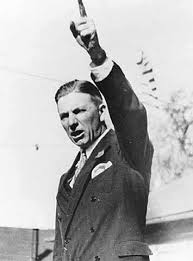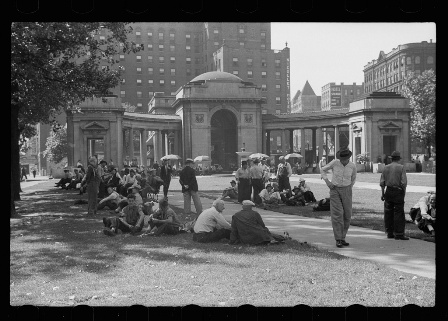
January 6, 1931
“Floyd B. Olson takes office as the state’s 22nd governor.” *
Governor Olson was many things to many people, but perhaps he is most known as the leader of the Farmer Labor Party. Why is this so critical to Minnesota, and our collective memory? After Olson’s victory, “the Farmer-Labor Party would emerge as the dominant political force in Minnesota. It became one of the country’s most successful third-party movements.” **
This famed reformer wore his Progressive Socialist agenda on his sleeve, and was happy to distinguish his movement from either Republican or Democratic thought previously known in the North Star state. He clearly advocated for the minimum wage. As a former Industrial Workers of the World unionist, he proudly supported trade unions and their most prized reform; collective bargaining. To properly finance his progressive view of social justice he proposed a progressive income tax. (A progressive tax is simply a plan based on the idea that if you earn more, you should pay more.)
How then would his policy stack up against historic economic theory regarding the utility of the minimum wage? “In economic theory, a price floor creates a surplus in the market place because there is more supply than demand at the set price. This theory applies to the market for labor as well. Some argue that when the minimum wage is raised, more people want jobs because now they are more lucrative. However new jobs are not necessarily created. Based on this standard economic model, when demand for labor is greater than the supply, a labor surplus results, creating unemployment.” *** To interpret, higher wages may attract more to the job market, new jobs are not necessarily created, and based on historical data; there is more unemployment.
Further, what are the strengths and weaknesses of unionism and collective bargaining as proposed by our Governor? Below is a quote by Labor Economics expert James Sherk.
“A union’s monopoly over bargaining makes it a cartel that prevents employers from hiring workers who would do the same job for less than union wages. That benefits union members at the expense of their potential competitors. It also means that state and local governments must pay more to have the same work done. Without providing financing for the mandate, the act will force these governments to either cut services or raise taxes.” **** By definition, a monopoly is the exclusive possession or control over something. So, perhaps it could be more accurately construed as “monopoly bargaining”?
According to the ideals of Governor Olson, for society to progress, it must have the tax base to right social wrongs and lift up the oppressed by the hand of government. “The income tax is the most just tax thus far devised because it is the most equitable tax; it is based on ability to pay,” he added.
Maybe this is why he borrowed from the collectivist visions of Karl Marx? Below are the first five planks of the original German interpretation of the “Manifesto of the Communist Party”, please note plank #2.
“1. Abolition of property in land and application of all rents of land to public purposes.
2. A heavy progressive or graduated income tax.
3. Abolition of all rights of inheritance.
4. Confiscation of the property of all emigrants and rebels.
5. Centralization of credit in the hands of the state, by means of a national bank with State capital and an exclusive monopoly.” ******
Shall we pray? G-d, we give You honor as the Authority of Authorities, Provider of All to All, and Justice to all forms of Justice. We remember that Your Dominion is not a matter of talk, but of power. You are the Only Arbiter of Grace and Truth. You are the Only One who perfectly balances Justice and Mercy!
We acknowledge our separations from You through the leadership of Governor Olson. We chose to follow the false god of Progressivism. We admit that we cannot bring a utopia through humanistic means. We are not able to grant unalienable rights or take them away for that is Your work; Your mystery. Though we try through the ages, we cannot improve upon the Shema of Deuteronomy 6, or by it recitation by Christ in Matthew 22:37.
“Jesus replied: “‘Love the Lord your God with all your heart and with all your soul and with all your mind.’ “ *******
Will You forgive us where we failed to love You in this era, and where we failed to receive Your love in return? Our hands hold so tightly to power that we cannot grasp the manna You are giving us today.
We acknowledge our separations from You in our trust in the minimum wage during the Great Depression. We have limited our neighbor’s right to negotiate a wage with their employer, and infringed upon that individual’s will. Though we try through the ages, we cannot improve upon the divine positive laws of the 10 Commandments.
To paraphrase, the seventh and tenth commandments tell us to respect and honor the property of others, and to be content with our property. How can we simultaneously respect and honor an employer whom we force to pay us more? How can we respect and honor our neighbor’s will if we interfere with it? Father, where allowed the real pain and discontent of the 1930’s cloud our boundaries and honor for other Minnesotans; will You have mercy?
We acknowledge our offenses to You and our neighbor in putting faith in collective bargaining and unions. (I do not condemn either of these ideas per se.) Chosen collectivism is beautiful and admirable. Look at the example of the early Church
found in Acts 2:44.
“All the believers were together and had everything in common.” ********
Where collectivism breaks with Your example, perhaps, is that it may negate the will of its’ neighbor. Why should a worker be required to join a union to work? If labor is the possession of each laborer, then forced collectivization could become extortion or ultimatum.
Why should an employer be required by a third party or law to negotiate with his employees on a collective basis? For example, the words ‘labor strike’ do not imply mutual submission with a boss towards a mutually defined goal, but a choice to break that relationship. Where we have broken faith with You, our neighbor, or our leaders through forced unionism or collective bargaining; will You have mercy?
We acknowledge our offense to You and our neighbor through our faith in a graduated income tax. We, as a State, may have required more of our neighbor’s wealth than You. Below, the prophet Malachi reports to the peoples of Judah to give to G-d the 10% flat tax He required.
“You are under a curse–your whole nation–because you are robbing me. Bring the whole tithe into the storehouse, that there may be food in my house. Test me in this,” says the LORD Almighty, “and see if I will not throw open the floodgates of heaven and pour out so much blessing that there will not be room enough to store it.”
If this is to be Your example to us, then is it true that those who fail to participate actually rob You and their neighbor? I’m not thinking here in terms of money, but of themselves. Those who do not invest in society may not develop an interest in society, or experience the gratitude of an unmerited gift from one who invests heavily. The relationship between giver and receiver is broken when it is required instead of choice. Further, for a progressive tax model to be truly even, could it require a non-monetary investment of time in lieu of a financial contribution? Will You have mercy on the uneven nature of our remedies to inequality?
In spite of these pondering prayers, will You bless the heritage of Floyd B. Olson? Will You remember his attempts to relate and create policies that contribute towards a better life for regular Minnesotans? Will You give honor and favor to those who labor at the minimum wage? Will You come to the aid of those who belong to a union, employ union labor, and collectively bargain in good faith? We want society to mature without acknowledging the revenge, envy, and discontent inside? Jesus, Son of David, have mercy on Minnesota! Will You perfect the progress of our inner lives?
“I will give you a new heart and put a new spirit in you; I will remove from you your heart of stone and give you a heart of flesh.” *********
* http://www.mnhs.org/about/dipity_timeline.htm
** http://www.mnopedia.org/person/olson-floyd-b-1891-1936
**** Article by James Sherk, Research Fellow, Labor Economics https://www.heritage.org/markets-and-finance/report/mandatory-collective-bargaining-creates-more-problems-itsolves
******* Quote of “Manifesto of the Communist Party” Chapter 2 (German original) https://www.marxists.org/archive/marx/works/1848/communist-manifesto/ch02.htm
******** http://biblehub.com/matthew/22-37.htm
******** http://biblehub.com/acts/2-44.htm
********* http://biblehub.com/malachi/3-9.htm
********** http://biblehub.com/ezekiel/36-26.htm


